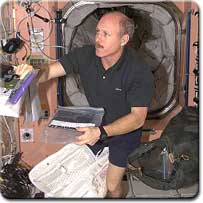Russia and the US will take "joint energy measures" to support the International Space Station after the Columbia disaster. This is what Russian President Vladimir Putin said on Friday
 Hal station's sixth crew member Ken Bowersox
Hal station's sixth crew member Ken Bowersox
Russia and the US will take "joint energy measures" to support the International Space Station after the Columbia disaster. This is what Russian President Vladimir Putin said on Friday.
Senior officials in the Russian space program said that they are ready to build more spacecraft (Soyuz and Progress), provided that the US and the other 16 partner countries in the station participate in the construction costs.
In the past, the station was served by both cargo ships and space shuttles. During the investigations into the circumstances of the Columbia disaster, the Russian ships became the only channel of communication to the station, which is now manned by two American astronauts and one Russian cosmonaut.
According to Putin, he and President Bush discussed the issue recently. "The President of the United States drew attention to the issue when he spoke to me on the phone and encouraged me to take the initiative to ensure the continued operation of the station," Putin said in a televised speech.
However, NASA has not yet decided what comforting help from the Russians. Director of the Russian Space Agency, Yuri Koptaev said at the beginning of his meeting with Putin in the Kremlin. The Russian Space Agency's budget, amounting to 130 million dollars, is entirely dedicated to the launch of two manned Soyuz spacecraft and three Progress spacecraft that bring supplies to the station in 2003.
The Itar-Tass news agency quoted Koptaev as saying that Russia would need to build another Progress spacecraft this year and three more next year to continue maintaining the station. Each Progress spacecraft costs 22 million dollars.
"What has been done so far by the US and Russia will have to be done by Russia alone," said Koptiev. "Naturally, this places additional responsibility on Russia and requires adjustments to the entire program." By this, Koptiev means Russia's approach to the US to reduce the station's crew from three to two - Russian and American, so that the replacements can be launched together with a Soyuz pilot. Russia also decided to change the composition of the crew, and instead of the crew that had already trained for the Space Shuttle Discovery flight at the beginning of March, one of the experienced cosmonauts who had already been on Mir would be sent to the station, and was destined to be on the station's permanent crew when it began full operation.
NASA said that it is still discussing the operation of the station with the Russians, but James Newman, NASA's coordinator in Russia, said earlier that US laws prevent the agency from purchasing additional ships from the Russians due to Russia's cooperation in the fields of nuclear and missile technology with Iran.
